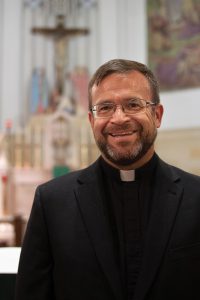
By Laura Melius
When we consider the great evangelists through history, who comes to mind? Matthew, Mark, Luke and John? St. Paul? Or a more recent example, such as Archbishop Fulton Sheen? What if we looked closer, much closer, to within ourselves?
As baptized Christians, we are all called to carry out this important work. For God to use us as evangelists, we do not need to be effective public speakers or prolific writers or have an abundant number of followers. We just need to recognize and answer his call to share the life-changing message that Jesus Christ is Lord and God.
Getting started

Where do we start on this task of evangelizing? How can we best share Jesus with those we encounter each day? The best place to start, no matter the situation or your season of life, suggests Audrey Anderson, parishioner at Cathedral of Saint Joseph Parish, is through prayer.
“Spend time in prayer getting to know God. Get to know what his voice sounds like, what his character is like. Share your desires with him and ask him how he wants you to respond,” Audrey says. “When you know how to hear his voice in the quiet of prayer, you will be more aware of what he sounds like in your everyday life. You will know if God wants you to talk to a certain person or offer someone help.”
Audrey believes both our words and our actions are vital for effective evangelization.
“If you speak openly and boldly about the good news of Jesus Christ, but don’t live in his grace, there is no evidence that God actually frees, restores and fulfills people,” she says. “There is a disconnect, and your message doesn’t come across as credible, let alone desirable. Similarly, if you live joyfully as a disciple of Christ, but never share where your peace and strength come from, most people will just think you’re a nice person or that you have a good personality.”
Father Andrew Dickinson, pastor at Sacred Heart and St. Mary parishes in Aberdeen, agrees.
“Our society confuses niceness with Christianity. We think that niceness is what Jesus wants,” Father Dickinson says. “Jesus wants us to be united to him, which often means being kind but is more than just being nice. Better than creating a dichotomy between words and actions, as if they are inherently opposed, I think it is better to look at evangelization through the corporal and spiritual works of mercy. They create a better platform.”
Using the works of mercy
The corporal works of mercy, identified by Jesus in the Gospel of Matthew, are to feed the hungry, give drink to the thirsty, clothe the naked, shelter the homeless, visit the sick, visit the imprisoned and bury the dead. The spiritual works of mercy, given to us in the Gospels of Matthew, Luke and John, are to instruct the ignorant, counsel the doubtful, admonish the sinner, bear wrongs patiently, forgive offenses, comfort the afflicted, and pray for the living and the dead.

Father Dickinson has observed that we are often more comfortable evangelizing through the corporal works of mercy. “The corporal works are readily acceptable to our post-Christian culture. We like being ‘nice,’” he explains.
We often see Christians engaging in the corporal works of mercy, such as serving dinner at a homeless shelter or visiting a friend in the hospital.
“The spiritual works of mercy are counter cultural because they testify that there is something more important than the body or bodily health. So, while corporal works are always in season, real evangelization comes about in our culture through the spiritual works,” Father Dickinson says.
We can be effective evangelists through the spiritual works of mercy even as we ourselves are afflicted.
“When I am having a hard day, I reach out to friends and ask what they need prayers for,” Audrey says. “I offer up my suffering for them, and many prayers have been answered in miraculous ways. Friends who are going through a season of suffering often reach out and ask how I am able to cope. I share with them about how Jesus brings good things, even out of suffering.”
Audrey adds that when we help a friend through either the corporal or spiritual works of mercy, we are both honoring our friend and Christ who lives within them.
“Ask the Lord to help you see the people in your life as he sees them. When your heart is moved with compassion for one of them, reach out to help,” she says. “Your authentic desire to help is an image of God’s heart, and that can be more healing than the act of help you are offering.”
Real life opportunities
Sometimes the opportunity to evangelize may happen unexpectedly and catch us off guard, as when we are asked a question about our faith. Father Dickinson offers some advice for these moments.
“First, when the opportunity comes, know your tendency. If your tendency is to be inquisitive, and your heart tells you to listen, then go against your tendency. If your tendency is to be quiet and your heart says, ‘Ask them about Jesus,’ then do it! The Lord often pulls us against our tendencies. Second, pray in your heart during and afterward. We might pray, ‘Jesus, what are you doing in their life? How are you working, and how can I serve your mission in their heart?’ After we’ve said whatever we can, entrust them to the Lord for several days afterwards.”
Audrey emphasizes that we don’t have to have all the answers. She says it can be incredibly effective to just tell someone that you don’t know the answer. Offer to ask someone who knows and get back to them.
“The humility it takes to say that builds trust, as long as you actually follow up,” she says. “Many times it is relieving to people who are just starting their faith journey to know they aren’t the only one who doesn’t know everything. It’s a great witness to show them that a relationship with God is something you have over a lifetime. You don’t have to memorize all the facts and then accept him.”
Youth have a role
Evangelization is not only entrusted to adults. Catholic Christians of all ages are called to share Jesus with others.
“Youth evangelize adults mainly through witness—witness in the Christian sense of a testimony made by a coherent life,” Father Dickinson says. “When an adult encounters a young person living a coherently Christian life, that makes the adult reexamine their own life. A young person giving such a witness powerfully convicts the conscience of adults.”
Audrey has seen high school and college students have a profound encounter with God at different events offered in the diocese. These encounters change how they live.

“They come home with a desire to live differently,” Audrey says. “They start digging into what it means to be in relationship with God. They start talking about their prayer life and wanting to live on mission for the Lord. And sometimes it freaks out their parents and other family members. Some adults haven’t had the opportunity to truly encounter God’s love, and while they may go to church regularly, volunteer and tithe, they don’t know God personally. When you know God personally, he engages both your intellect and your heart. Youth and young adults can be very passionate about finding their purpose and when they find what God’s purpose is for them, they do great and wonderful things. Their joy is contagious to anyone in the community, young or old.”
We must remember to evangelize in good times, too. “Remind people to thank God,” Father Dickinson suggests. “I use my Facebook in a deliberate way. When I see people with good news, I use deliberately Christian phrasing. For example, ‘Praised be Jesus Christ!’ This reminds myself and others to give thanks to God, the giver of all.”
As we strive to be better evangelists, Father Dickinson believes seeking God’s wisdom will guide us both as individual Catholics and through our parishes.
“Wisdom, simply said, is to do the right thing, in the right way, at the right time,” he says. “God, in his wisdom chose to be incarnate in the womb of the Blessed Virgin and to bring salvation at a time long before technology, printing presses, social media and modern marketing. These things can help his mission today, but they cannot be confused as his mission. For parishes to make this transformation, to change people that eventually change culture, we’ll need patience and tenacity. Good thing the Lord has plenty! Let us ask God to make us his instruments.”


